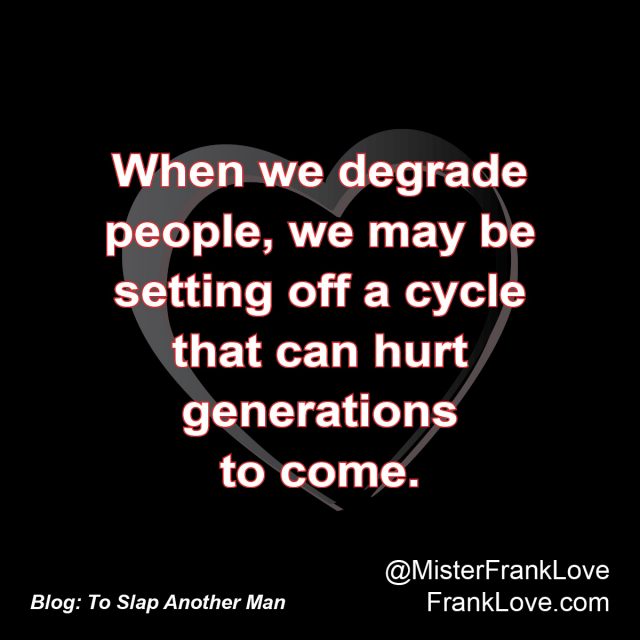
In my previous blog “Empathy: What’s the Point?” I talked about how powerful using empathy in our loving relationships can be. Today’s blog post looks at what happens when there is a lack of empathy and thoughfulness in our decision-making processes.
Chris Rock and Will Smith are back in the news. The story has evolved from the chatter and media focus on the opinions of everyone other than Chris Rock now that he has weighed in through his new Netflix special, Selective Outrage.
For those who are completely unfamiliar with the incident, Chris Rock, who was the host for the 2022 Academy Awards ceremony, made a joke about Jada Pinkett Smith’s hair (or lack thereof) as she sat in the audience. Will Smith, also an audience member, initially laughed, then walked on stage and slapped Chris Rock. Will returned to his seat and yelled, “Keep my wife’s name out of your fu(i<ing mouth,” (or something to that effect . . . I am working from my memory and am not going to research these specifics). Chris Rock joked about the incident immediately after it happened and continued with his job for the night.
There are a number of things about this incident that trouble me. They include:
- Someone assaulting another person as they perform.
- Someone who is insulted enough to assault someone on stage.
- Someone who violently changes the tone of a ceremonious occasion to seemingly promote their manhood.
- Inciting a fight with anyone in front of millions of people.
However, more than assaulting another person, the most displeasing component of all of this is the way Will chose to assault Chris. He slapped him. Will did not simply assault Chris; in my humble opinion, Will attempted to assault Chris’s manhood. He attempted to assault Chris’s standing as a father. He attempted to assault Chris as a potential husband.
Ok. Enough about Will and Chris for the moment. My issue and concern is not with how Will treated Chris. My issue is with the reason Will wanted to demean Chris. On a grander scale, my issue is about why any man wants to demean another.
Over the years, on television, movies, and in person, I have witnessed an array of men make comments such as “I’ll slap him” or “I’ll slap the shi+ out of him.” When hearing these comments, I am usually puzzled at the desire and effect of the speaker. He isn’t saying, “I’ll punch him,” “I’ll hit him,” or “I’ll knock him out.” He is talking about slapping. This is demeaning. To threaten to slap another man is an attempt to degrade.
What is the problem with degrading another man? Easily, it’s the same problem as degrading anyone (including elders, women, and children). Each of us wants to be dealt with respectfully. We want to be able to ask stupid questions without someone saying and/or acting like we’re stupid. We want to be dealt with as though others care about what we are going through.
Undoubtedly, there is a litany of variables that contributes to whether other people deal with us in that manner. Some of these variables we bring. Some of them others bring. But the way we want to feel is relatively universal—and that’s respected.
Slapping a man is different than hitting him. Hitting a man is an overture toward a fight. Slapping is a form of punking him. It is a way to communicate to another man that he’s a bi+ch. “I don’t even have to attempt to hurt your body because it is enough for me to take your heart by smacking you. You don’t deserve me to hurt you physically. I don’t need to exert that kind of energy on you. I can smack you, and there is nothing you will do in response.” This is a horrible statement to anyone.
When we hurt people, in particular when we degrade people, we do not know where the hurt will end. When we knowingly and willfully contribute to someone else’s painful experience, particularly in front of others, we are contributing to their degradation. If a person has a family, they will be affected too.
There are countless stories of young people seeing their heroes demeaned or belittled and dedicating their entire lives to never being a befallen hero in front of other people. These people go out into our community and affect others and their families.
If we are going to have an effect on others (and we undoubtedly will), let’s have a positive effect. Let’s build them. Let’s respect them. Let’s help them be heroes to their children. Let’s help them be respected.
From one father to another, what Will Smith did to Chris Rock was unconscionable. I am sure there were countless children, including Chris’s, who watched Chris be slapped and who never want to be taken advantage of the way they saw Chris Rock be taken advantage of . . . ever. They never want to be a fallen hero and may structure their lives, or at least a part of their lives, based on fear and a desire to never look like a victim. These children may spend an inordinate amount of time attempting to avoid being belittled in the future, possibly through belittling others. This cycle is troubling, and we can all set better examples.
like a victim. These children may spend an inordinate amount of time attempting to avoid being belittled in the future, possibly through belittling others. This cycle is troubling, and we can all set better examples.
As we move forward, let’s remember that our actions in our homes and within our communities have great effects that we cannot definitively predict. Given our ignorance in predicting the future, let’s do all that we can to plant seeds that will provide examples of awareness, integrity, and care. And that’s loving.
Keep Rising,
Frank Love
In my next blog post “You Didn’t Think To…” I will discuss why respectful word choice is valuable in maintaining our loving relationships.
Watch Frank Love’s presentation “The Act of Caring.”
Subscribe to receive Frank’s weekly blog.
Become a sponsor of Frank Love and his work creating loving cultures in our relationships with a monthly contribution of as little as $2. Sign up today at Patreon.com/FrankLove.
–—–—–—–—–—–—–—–—–—–—–—–—–—–—–—–—––
Each week, Frank Love hosts Zoom support group meetings that assist women and men as we work to create a loving culture in our relationships. Calls occur from 7 p.m. to 8:30 p.m. EST and can be accessed by visiting FrankWeeklyCall.com.
- Tuesdays—Black Women: Creating a Loving Culture in Our Relationships
- Thursdays—Black Men: Creating a Loving Culture in Our Relationships
–—–—–—–—–—–—–—–—–—–—–—–—–—–—–—–—– –
Frank Love coaches individuals toward creating a loving culture in their family. He is also the author of Relationship Conversations You Don’t Want to Have (But Should Anyway) and 25 Ways to Be Loving. To schedule a free consultation, contact Frank at Frank@FrankLove.com.

